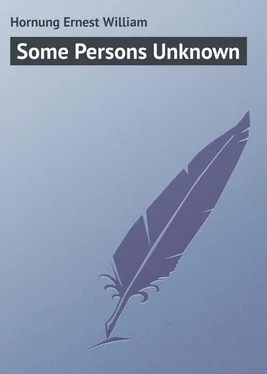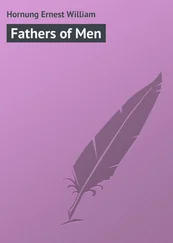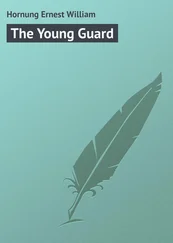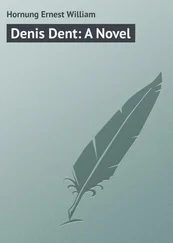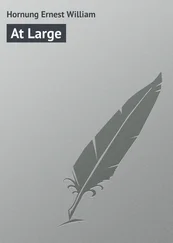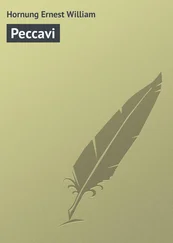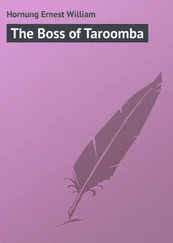Ernest Hornung - Some Persons Unknown
Здесь есть возможность читать онлайн «Ernest Hornung - Some Persons Unknown» — ознакомительный отрывок электронной книги совершенно бесплатно, а после прочтения отрывка купить полную версию. В некоторых случаях можно слушать аудио, скачать через торрент в формате fb2 и присутствует краткое содержание. Жанр: foreign_prose, на английском языке. Описание произведения, (предисловие) а так же отзывы посетителей доступны на портале библиотеки ЛибКат.
- Название:Some Persons Unknown
- Автор:
- Жанр:
- Год:неизвестен
- ISBN:нет данных
- Рейтинг книги:4 / 5. Голосов: 1
-
Избранное:Добавить в избранное
- Отзывы:
-
Ваша оценка:
- 80
- 1
- 2
- 3
- 4
- 5
Some Persons Unknown: краткое содержание, описание и аннотация
Предлагаем к чтению аннотацию, описание, краткое содержание или предисловие (зависит от того, что написал сам автор книги «Some Persons Unknown»). Если вы не нашли необходимую информацию о книге — напишите в комментариях, мы постараемся отыскать её.
Some Persons Unknown — читать онлайн ознакомительный отрывок
Ниже представлен текст книги, разбитый по страницам. Система сохранения места последней прочитанной страницы, позволяет с удобством читать онлайн бесплатно книгу «Some Persons Unknown», без необходимости каждый раз заново искать на чём Вы остановились. Поставьте закладку, и сможете в любой момент перейти на страницу, на которой закончили чтение.
Интервал:
Закладка:
He was aware, however, that this morning he was breaking all his rules. He was about to invent in the room where it was his practice only to write down what he had invented elsewhere. He got up and paced the room in order to do so, and this was another rule broken, for he very seldom stirred from his chair between ten o'clock and one. And now, as he walked, Wolff Mason's eye was caught by the packet from that promising contributor who could write so amusingly when he liked; the creative portion of his brain gave sudden way to the editorial; and the editor informed himself, with a characteristic chuckle of self-depreciation, that the new man's story would in any case amuse him more than his own was doing at the moment. At all events he would try it. He had broken so many rules already that he caught up the interesting envelope with a certain recklessness, and having lighted his fourth pipe, sat down to read manuscript as calmly as though it were three o'clock in the afternoon instead of the middle of his sacred working morning.
The story, which was quite short, was accompanied by the unpresuming business-like note which this contributor always forwarded with his literary offerings. It was called "A Good Father," which was not a very good title, but the editor prepared to give it his "careful consideration," in accordance with the pledge embodied in his printed notice to contributors. He pushed his spectacles on to his forehead and began to read with the manuscript held close to his nose. Over the third leaf his fine, thoughtful forehead became scored with furrows; on the fifth he exclaimed "Ha!" Half way through the story he muttered "Upon my word!" and a little later, "A most remarkable coincidence." Then his face lost its interested look under the gathering clouds of disappointment, and he finished reading with a brow awry.
"Not free from merit – anything but free – yet it won't do! This is a young man with a naturally sweet sense of humour, but something has embittered him since he first began to send me his stories. I wish I knew what! He is the most disappointing person I have had to deal with for many a day; a writer after my own heart, which he is half breaking with his accursed childish cynicism!"
The genuine character of the editor's regrets was obvious (to himself) from the fact that all his observations were made aloud. He very seldom caught himself in the act of soliloquy; it was yet another of the several irregularities which were destined to stamp this day in the memory of one who notoriously lived and worked by routine. The matter of the unacceptable story, however, suggested an entry in the commonplace book in which he was accustomed to accumulate raw material for future use. He felt happier when he had jotted down a note or two anent the cynicism of the modern young author and his lamentable liking for unhappy endings. The story he had just read ended shockingly, and all owing to the unnatural obduracy of an impossible parent, the "Good Father" of the cynical title. Otherwise it was a very good story indeed. The coincidence, however, was quite remarkable. Paternal opposition was the rock on which Wolff Mason's own pen had split that morning. But his old general was not going to run him into an unhappy ending – not he! He turned to that irate personage with positive relief, and saw his way more clearly after the ten minutes he had spent in the company of a much more terrible specimen of the same class. What he did not see was the full force of the coincidence which had caused him to exclaim aloud. It was a double one; but the man of letters lived a double life, and in the atmosphere of fiction had forgotten those unpleasant facts which had compelled his attention earlier in the day.
Another matter worried the writer when the clock struck one, and he found himself mechanically wiping the pen that had inscribed some twelve hundred and fifty words only instead of the regulation fifteen hundred. He felt humbled by a sense of failure most mortifying at his age, and though he put away his papers and went off to the club as usual, he was not in his customary spirits, and the younger novelists who listened for his good things, in order to repeat them to their friends, heard nothing worth taking home with them that day. One of the latter, indeed, broached very deftly the subject of Wolff Mason's books; but the veteran treated the subject with unnatural seriousness, was aware of the unnaturalness himself, and left the club before his time in an evil humour. And evil humours were the greatest rarity of all with the editor of the Mayfair , whom common consent credited with the most charming personality in literary London.
By two-thirty he was back in the editorial chair; the first of a newly-loaded set of pipes was in full blast under his nose, and the remaining contents of the little table under the window were being dealt with carefully and in turn. Not one of them proved to be of any use at all. In each case this kind-hearted man felt it his duty to pen a considerate little letter explaining the reason of rejection in the present instance, and encouraging the unsuccessful contributor to further effort. It is amazing, indeed, and little known, what a talent Wolff Mason had for the composition of kindly little notes of this nature; he made even the rejected love him, for his heartening words, and for the sympathy and humour with which he tempered disappointment to his tender young contributors.
Last of all this afternoon he returned to "A Good Father," and glanced over it again with a sigh. Then he took a sheet of Mayfair Magazine note-paper, and scrawled the date and "Dear Sir." There he stopped. After a few moments' hesitation, the spoilt sheet was dropped into the waste-paper basket, and a new note begun with "My" thrown in before the "Dear Sir." But the editor paused again.
"Confound the fellow," he cried at last, "I'll treat him as a friend! The chances are he'll turn and rend me; but here goes."
The note that was eventually written and posted ran as follows: —
"Dear Mr. Evan Evans, – I think that 'A Good Father' is excellent, but on the whole it does not strike me as being in your best style – which is capital. If I may be permitted to make an unofficial observation, you will, I think, pardon the expression of an old man's regret that a writer with a real sense of humour, like yourself, should subordinate it to what strikes one as an alien melancholy. If you would only write as cheerfully as you did some time back, I should be spared the disappointment of returning your MS., which I shall never do without peculiar and personal regrets.
"Yours very truly, "Wolff Mason."The good editor breathed more freely when he had got this letter off his mind, and had addressed it to Evan Evans, Esq., 17, Cardigan Mansions, Kensington, W., and closed the envelope with his own hand and tongue. It was his last act at the office that day. As he tossed the letter into one basket, and the rejected manuscript into another, the clock on the chimney-piece struck the half-hour after four. And at half-past four in the afternoon, summer and winter, seed-time and harvest, with the annual exception of a hateful holiday at some such place as Saltburn, the editor of the Mayfair Magazine returned to his club to play whist for an hour and a half precisely, with three kindred spirits as methodical and as enthusiastic as himself.
But this was the exceptional day which proved every rule of Wolff Mason's most ruly life by causing him to break each of them in turn. He played his cards towards evening as amateurishly as he had chosen his phrases in the forenoon. Now what is about to be written down may never be believed. But at five-thirty-three, by the card-room clock, Wolff Mason, who was more eminent among the few as a whist-player than as a writer of novels, put the last trump on his partner's thirteenth card. One has it on unimpeachable authority. A few minutes later the rubber came to an end, and, instead of playing out time, as the custom was with this sporting quartette, the novelist complained of a slight faintness (which explained everything) and left the club twenty minutes before six for the first time for many years.
Читать дальшеИнтервал:
Закладка:
Похожие книги на «Some Persons Unknown»
Представляем Вашему вниманию похожие книги на «Some Persons Unknown» списком для выбора. Мы отобрали схожую по названию и смыслу литературу в надежде предоставить читателям больше вариантов отыскать новые, интересные, ещё непрочитанные произведения.
Обсуждение, отзывы о книге «Some Persons Unknown» и просто собственные мнения читателей. Оставьте ваши комментарии, напишите, что Вы думаете о произведении, его смысле или главных героях. Укажите что конкретно понравилось, а что нет, и почему Вы так считаете.
